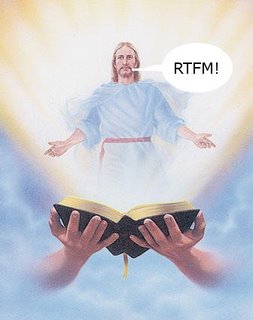
At this point in our investigation of Romans 1, we're standing at the crossroads of theology and ethics. Previously, we asked what this chapter had to say about the nature and preferences of God ... now we would like to know how this passage should inform our day-to-day behavior.
Frankly, the crossroads of theology and ethics is a confusing place to be. Stretching off in one direction, you have millennia of speculation, argument, and perhaps revelation about the divine. In the other direction, you have millennia of theory, argument, and perhaps revelation about the nature of the good. One of the most difficult questions to be found at this intersection is the question of who gets to say what's good: is God good because God knows the good and does the good, or is God good by definition, so that everything that God does or commands is the good thing to do, and ethics are thereby created ex nihilo.
While some choose the latter definition, I think that this makes it meaningless to say "God is good". As C.S. Lewis writes in one of his last letters*:
Things are not good because God commands them; God commands certain things because he sees them to be good. (In other words, the Divine Will is the obedient servant to the Divine Reason.) The opposite view (Ockham's, Paley's) leads to an absurdity. If "good" means "what God wills" then to say "God is good" can mean only "God wills what he wills." Which is equally true of you or me or Judas or Satan.
I think the need for the goodness of God to mean something is my primary motivation for believing that we should define "goodness" as something other than simply what God does or wills. Lewis speaks directly to this issue again in the same letter:
The ultimate question is whether the doctrine of the goodness of God or that of the inerrancy of Scriptures is to prevail when they conflict. I think the doctrine of the goodness of God is the more certain of the two indeed, only that doctrine renders this worship of Him obligatory or even permissible.
While I think we could argue about whether the doctrine of the goodness of God is the more certain doctrine, it seems very clear that this is the most critical doctrine for justifying our worship of God (as opposed to, say, Satan).
So I am going to assert that God's commands don't create the good, although it's possible that they will always align with the good.
Now we run into another troublesome question, which is: "How do we extract moral imperatives from the text of the Bible?" Remember, first, that I am not supposing the Bible to be the source of all moral instruction. I am assuming that people have some notion of good and evil, and the Bible's moral teachings are primarily useful for honing or enlightening that moral sense. Furthermore, I am also assuming that the Bible contains some passages that are ethically questionable: the flood, the conquest of Canaan, God's command to keep the virgins but kill everybody else, any of David's darker episodes, Jesus' commands to reject your family:Passages that are easily interpreted as endorsing evil. **
For these reasons, we can expect to find two types of moral injunctions in the Bible: first, those that resonate with our moral sense, and second, those that scrape against it. It would be nice if we could just accept the injunctions that sound right, and reject the ones that don't ... but this won't work, because we would like to preserve the possiblity that the Bible can teach us something we don't already know. "Love your enemies" sounds pretty iffy to me, but I expect that if everyone practiced this, the world would be significantly better.
Consequently, I'm just going to kind of punt here, and proclaim, "it is difficult to extract moral instruction from the Bible." It is difficult to understand which scriptures should directly apply to modern-day readers, know their background, examine them in context, consider the biases of the writers, attempt to set aside one's prejudices, and so on. Maybe when I read The Moral Vision of the New Testament, I'll be able to suggest a more systematic and reliable approach. But until then, my advice is: Mistrust anyone who says that they can draw a clear and universal moral injunction from the clear meaning of any single chapter or verse. It's just not that simple.
So what do we do with this passage in Romans?
With regard to homoerotic behavior in this passage, it seems to me that we have to consider two opinions. First is the opinion of God, which I've argued is not clear. As I said in the previous post, Romans 1 is merely a setup for Paul's larger point about the mercy of God, and so its theological implications should be limited to:
Because the Gentile culture was rebellious, God allowed it to become even more rebellious and corrupt.
On the other hand, we also need to consider the opinion of Paul. Granted, it's not very explicitly stated, but I think Scoots is right when he says that Paul is presenting a set of behaviors as "the epitome of fallenness and wickedness." (Or at least the things that his audience will think are the epitome of fallenness and wickedness. It's a set-up, remember?)
So what should we do with this negative portrayal of homoerotic behavior? Should we elevate it to a moral imperative? I don't think so, and briefly, here are some reasons why. I've mentioned some of them in previous posts, but I'll try to gather them together here.
First: Homoeroticism is a gender issue, and Paul has a track record of going contrary to the gospel on gender issues. Some speculate that this is because Paul had to walk a middle line in order to get the church going, and had to give up certain issues (women, slaves) to work on the toughest issue of the day (Jews and Gentiles).
Second: The Bible as a whole has kind of a shady reputation with regard to sex and gender issues. Take, for example, the aforementioned virgins, or the treatment of victims of rape, or the double-standard for adultery (it's OK for men as long as the woman isn't married, but for women it's never OK), or Old Testament polygamy, or the notable lack of guidance with regard to premarital sex. Until Christians can come up with a coherent sexual ethic, we need to be very careful about the parts of the Bible we elevate to rules for other people.
Third: The passage only speaks to homosexual lust, not committed homoerotic behavior. Some scholars think that it really only applied to the odd sexual practices and self-mutilation involved in Roman cultic worship, and to make it an all-encompassing prohibition would be to overextend.
(a link from Crystal has the best discussion of this perspective that I've read, as well as some very interesting Catholic insights).
Fourth: We've tried the anti-gay interpretation, and it has had bad results for homosexual people. It has pushed them out of the church, and resulted in violence and hate against them. It seems that we're incapable of "separating the sinner from the sin", and the moral imperative to love the alien and stranger simply trumps any moral imperative we might be able to derive from this text. As far as I can see, telling gay people "we think God thinks you should get married" can't make their situation any worse, and it may make it a whole lot better.
So there you have it: so far as I can tell, there is no compelling reason to interpret this passage as saying "all homoerotic behavior is evil." If there is a moral prescription to be drawn from this text, I think the best we can do is, "don't mess around with cult prostitution."
And so this completes our round of the major scriptures that seem to touch on homoerotic behavior. In my opinion, these scriptures -- whether taken individually or together -- should not be interpreted as communicating God's displeasure with homoerotic behavior per se, or as constituting other evidence that might convince us that homoerotic behavior is inherently evil. As a result, we as Christians are free to affirm the value of the scriptures, while also saying that they do not require condemnation of homoerotic behavior in a consensual, committed relationship.
----
For more (and much better) reading on this topic, I'm going to post three PDFs excerpted from books. These were provided to some faculty members at ACU before the SoulForce ride. If someone who owns the rights to these documents complains, I will take them down. (In other words, get 'em while they're hot.) I'm also going to repeat the link to the Catholic theologian that Crystal referenced, just because I think his argument communicates well.
Also, because I'm lazy, I have decided not to take my own snarky notes out of the PDFs. Read them at your peril.
- "Awaiting the Redemption of our bodies: The Witness of Scripture Concerning Homosexuality", by Richard B. Hays
- "The Bible and Homosexuality: Reading the Texts in Context", by Victor Paul Furnish
- "The Bible and Homosexual Practice: Theology, Analogies and Genes", by Robert A.J. Gagnon
- "Six Perspectives on the Homosexuality Controversy", by Theodore Grimsrud
- "'But the Bible says...?' A Catholic Reading of Romans 1" by James Alison
I remember finding the Gagnon piece to be fairly repugnant, but I wanted to include all the PDFs, so there you go.
----
*Quoted in a letter from C.S. Lewis to John Beversluis July 3, 1963. The letter can be found in C.S. Lewis and the Search for Rational Religion, and portions are quoted in Biblical v. Secular Ethics: The Conflict ed. R Joseph Hoffman.
** I'm pretty sure that I'm not using the words "morally" and "ethically" correctly. Any insight would be appreciated.


















